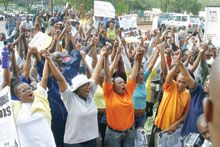BFTU to put policies to congress
RAMPHOLO MOLEFHE
Correspondent
| Thursday March 15, 2007 00:00


The great challenge of the outgoing leadership will be to put these policies - apparently many of them not new to the older affiliates - to congress on March 24. Congress is likely to elect a new leadership, perhaps the bulk of it from the newly registered trade unions, which emerge from the civil service whose employees were prohibited from full enjoyment of the right to'freedom of association'.
This right was extended to the government employee associations - several of them classified as 'essential services' thereby denying them the right to strike - only after parliamentary legislation in 2005 which put into legal effect the human rights conventions of the International Labour Organisation (ILO).
The newly registered unions will, according to the BFTU constitution, enjoy rights only accessible to the most populous Manual Workers Union, which was the largest contributor to subscriptions and congress delegates.
The teachers in particular appear to command a formidable mass base next to the Botswana Unified Local Government Service Association (BULGSA) which appears to be locked in 'a love affair of convenience' with the manual workers whose relations with the BFTU leadership have been less than friendly. Lukewarm at best. Belligerent at their more usual worst.
The task of passing on the commitment and wisdom of 30 years that went into policy formulation will be daunting despite the promise of BFTU Secretary General, Tebogo Makhale, that the spirit of those documents will be infused into the presidential and secretary general's reports, plus the policy papers. This time around, the BFTU leadership proposes a more open and vigorous electoral process. Whereas in the past, candidates would appear on the list of nominees on the eve of the elections, this time around the candidates will be required to produce manifestos for perusal by congress about a week before voting day.
By then the influence of the outgoing leadership will have expired. The new leaders will be compelled to make a plan to facilitate official registration of the new unions with the BFTU, in part, to counteract the apparent ambivalence of the manual workers and their allies to come into the fold.
Union officials point out that the BFTU has only been able to conquer between 10 and 20 percent of potential affiliation. They want at least 50 percent soonest. That is also important for credibility with the employers, government being the largest and most instrumental in influencing trade union friendly legislation.
Expansion of the affiliate membership will also be important for international recognition and for continued assistance by donor/partner organisations.
The new leadership will also be charged with organising 'the unorganised and the disorganised', according to Makhale.
Among these are the farm labourers and domestic workers 'who exist on the peripheries of the labour movement', Makhale says.
He also says that the refurbished BFTU will have to combat 'legislative disempowerment'. He points out that only 12 years after independence did the government join the ILO. It took 19 years for the government to ratify the ILO conventions. It took yet another seven years for enactment of the law that would put the conventions to work.
The attitude of the government has been to promote capitalism and a minimalist welfare state at the expense of workers rights, Makhale argues.
He bemoans government's pursuit of foreign direct investment without due regard for workers interests.
According to the BFTU policy paper on globalisation (2007): 'Globalisation has been accompanied by increased insecure types of employment mainly through the phenomenon of casualisation. Increased competition, especially for foreign direct investment, has resulted in undermining of human and trade union rights, especially the right to organise and negotiate.'
The creation of an environment that will attract foreign direct investment (FDI) has in turn suppressed worker wages and deprived the workers of the right to negotiate pay and improved living standards, the union leaders say.
Over the years the right to strike and to have access to mediation in industrial disputes were effectively prohibited. The tripartite negotiation platforms only gave advice and were not effective as bargaining tools for the workers.
The unionists point out that the government effectively denied the workers the right to negotiate their salaries by unilaterally declaring a six (6) per cent wage adjustment.
Makhale believes that the workers should 'put aside the victim mentality' and seize every opportunity to actively participate in matters that will decide their fate.
He believes that workers will be within their right to negotiate even those areas of their social existence that are not limited to wages and working conditions.
'In the absence of a vibrant opposition and an active civil society, the workers have every right to extend their mandate to those economic, political and social issues that have a bearing on their lives,' argues Makhale
'The workers should be bold enough to discuss questions of poverty and social justice which have everything to do with the quality of life of employees and their families,' he says.
Makhale believes that the new leadership would continue the process started in 1997 to consolidate the unions. 'We now have about 26 affiliates, but we would prefer that they should be consolidated into 10 or 11 along the principle of one industry, one union,' he says.
'That way the unions can effectively use their numbers to the greatest advantage,' says Makhale.
